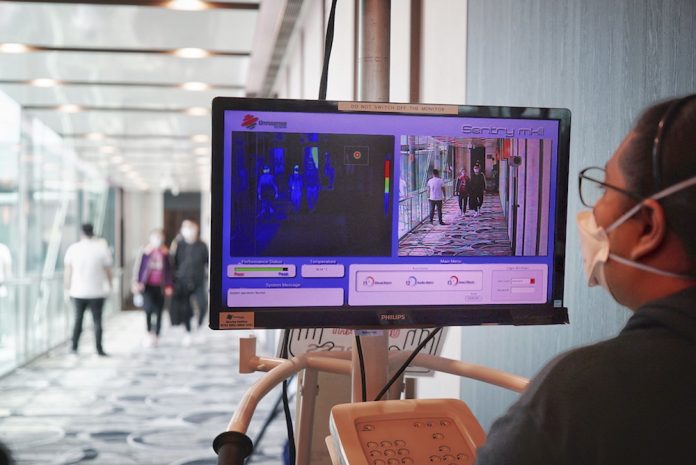Analysts believe that there will be an economic impact caused on Macau due to the recent outbreak, especially because of a possible reduction in the number of visitors during the Chinese New Year holiday period, but that its true extent is hard to predict.
Rating agency Fitch Ratings has stated today that should the Wuhan viral outbreak escalate sharply, macroeconomic effects would initially be felt the most in Asia, and especially in the service sector activity, particularly in fields associated with tourism.
‘This could leave economies such as Thailand, Vietnam and Singapore exposed, along with Hong Kong and Macau, both of which are already on Negative Outlook,’ Fitch Rating noted.
Predictions for the number of visitations to Macau during the Chinese New Year and for the city’s final GDP in 2020 were already negative due to external economic factors such as the US-China trade war, and the impact of the Hong Kong political unrest in visitation numbers.
The Macao Government Tourism Office (MGTO) indicated that although the number of total visitor arrivals increased 10.1 per cent year-on-year in 2019 to more than 39.4 million, they expected a 3 per cent year-on-year drop this year, in what would be the first decrease in visitors since 2015.
So far, the International Monetary Fund has projected that the local economy would finish 2019 with a 1.3 per cent fall, with 2020 to see a 1.1 per cent fall, while the Economist IU estimated a 3.3 per cent fall and the University of Macau expected a 3.7 per cent drop.
It rests to see how the Wuhan pneumonia will impact these already negative predictions.
“Certainly, whenever there is a disease or a scare this will discourage people or serve as a constraint to people wanting to come and travel, particularly cross country, but with Chinese New Year starting [tomorrow] and particularly for migrants, they have already started travelling,” John Ap, a Professor in Tourism Management at the Institute for Tourism Studies (IFT) told Macau News Agency.
“There might certainly be [an economic impact]. There is a certain degree of uncertainty. From my perspective, as a Macau resident […] we still don’t know the true extent of the infections, because during the 2003 SARS epidemic there was little information provided. The fact that we already have a number of people who have been infected in Japan and Thailand it’s worrying.”
The first reports of the outbreak in the Hubei city of Wuhan came in the beginning of the month, however, travel restrictions were only imposed in Wuhan and other Hubei cities yesterday.
Chinese authorities said today that the death toll from the viral outbreak has risen to 25, with the number of confirmed cases also leaping to 830.
In 2003, SARS led to 8,100 reported cases with 774 fatalities, but no large-scale quarantine in Chinese main cities was put in place at the time.
So far outside of Greater China cases have been reported in Singapore, South Korea, US, Thailand, and Japan.
“Quarantine is the most practical and logical thing to do but it’s too late. Unfortunately, we are still in the early stages. I predict people will still continue to come to Macau, particularly if they did not pass through Wuhan or other cities,” Ap stated.
“My main concern is that at this time of the year when you have mass movements of so many people that the chances for spreading the infection can be a lot worse and exacerbate the situation. The timing is not very good.”
The Lunar New Year holiday season this year will start on January 25 and last until February 8, a time when millions of Chinese residents return to their family hometowns and one of the peak visitation periods in Macau.
“They will probably continue to travel and hopefully will be able to take extra precautions […] Certainly, the Health Bureau will be implementing fairly strict screening procedures, similar to what has been done in Hong Kong,” he added.
Since the outbreak was first reported, local authorities have so far banned excursions to and from Wuhan, where the virus was detected, cancelled the Lunar New Year celebrations that were supposed to start today.
Several public buildings, museums and sports facilities will also be closed and authorities are carrying out disinfection in public places (public markets, transport) and have forced civil servants and casino workers to wear masks, with the possible closing of casinos if the situation gets worse.
Body temperature checks are also being conducted in entries and exits at border checkpoints, with visitors requiring to fill up health inquiries before being allowed to enter.
According to analysts from Sanford C. Bernstein, while at this stage they have not heard of material cancellations of hotel bookings or customer visits for the holiday period, they believe ‘there will be cancellations’ for the holiday period.
‘We see an increasing near-term risk for short-term negative impact on Macau. Unfortunately, the widening infection rate is leading to growing concern around the negative effect on Macau and travel in general, especially during the upcoming Chinese New Year holiday period,’ analysts Vitaly Umansky, Eunice Lee, and
Kelsey Zhu stated in a note issued on the matter.
‘We have also learned that there are likely to be cancellations of some CNY casino and junket parties and events, which if true, signals that the CNY period will likely see softer business than anticipated. Our prior estimate for January and Jan/Feb (combined) of -1 per cent to +2 per cent y/y will likely be too bullish’.
However, the brokerage itself admits that the impact both on visitation and on gaming revenues is ‘impossible’ to predict as of today and ‘would be only guesswork’.
Andy Wu Keng Kuong, chairman of the Travel Industry Council of Macau, told Macau News Agency (MNA) that it’s difficult to predict how the disease will evolve, but he expects a 10 per cent year-on-year drop in overall visitor numbers.
However, Wu told MNA that if the disease fails to be contained and worsens, its impact on the local economy could be worse than the SARS outbreak 17 years ago.
The SARS outbreak in 2003 only saw one case reported in Macau.
However, due to the considerable impact to the Hong Kong economy, Chinese authorities of an individual visa scheme to residents of several cities in the Guangzhou province, as well as Beijing and Shanghai, who wished to travel to the two SARs.
In the first half of 2003 – which coincided with the worst period of SARS – Macau recorded a 7.5 per cent year-on-year drop in the total number of visitors to about 5 million, but curiously the number of Chinese visitors at the time increased 21.6 per cent to 2.2 million, thanks to the individual visa scheme introduced by Beijing.
The new policy led to Chinese visitors becoming for the first time the main tourist generating market to Macau, with the overall number of tourists increased by 3.1 per cent year-on-year to 11.8 million by the end of 2003, of which 48 per cent were from Mainland China.
By the end of 2003, the city GDP had also increased by 11.65 per cent, with the city finishing with MOP30.3 billion in gross gaming revenues that year.





















